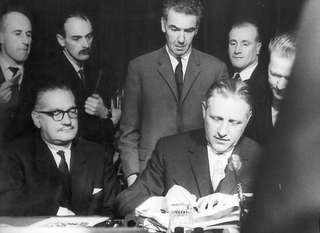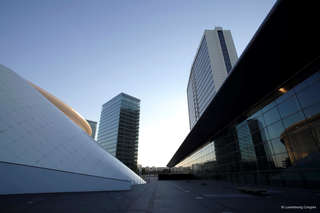A host of European institutions or related services have their seat in Luxembourg or are based in part in the Grand Duchy. But which institutions exactly? And how and why has Luxembourg become the seat of European institutions alongside Brussels and Strasbourg?
In his memoirs, Jean Monnet described how the city of Luxembourg was chosen as a provisional location. It happened in Paris on the night of 23 July 1952 when, at 3 a.m., after prolonged debate on the Treaty of Paris which established the European Coal and Steel Community (ECSC), "they heard the voice of Joseph Bech [Minister of Foreign Affairs of the Grand Duchy], who up to that point had appeared to be dozing: 'I suggest that work begins immediately in Luxembourg, that will give us time to think about the future.' Everyone was relieved and that explains how the ECSC got its precarious seat in this little city that has become a crossroads of Europe".
The capital of the Grand Duchy also became the temporary seat of the High Authority, the Advisory Committee and the Court of Justice of the ECSC. The meetings of the Special Council of Ministers were also held there. Although sessions of the Common Assembly were held in Strasbourg, its secratariat was based in Luxembourg.

The question of the seat of Community institutions was far from being settled however. In April 1965, the signing of the Treaty merging the executives of the three Communities (ECSC, EEC and Euratom) resulted in the grouping of the majority of the services of the Council and the Commission in Brussels. Luxembourg then lost the seat of the High Authority of the ECSC, although in return secured the presence of judicial and financial institutions. In the decision annexed to the Merger Treaty, the city of Luxembourg was referred to, alongside Brussels and Strasbourg, as the provisional location of the Community institutions, with the idea being to centralise all legal and financial jurisdiction and activities of the European Community on the Kirchberg Plateau in the Grand Duchy.
Recognition of the plurality of the seats of the Community institutions by the Edinburgh European Council of 12 December 1992 meant that the vested rights of Brussels, Luxembourg and Strasbourg were finally upheld by law. Protocol No 8 to the 1997 Treaty of Amsterdam firmly rooted the Edinburgh Agreement in the European Treaties.

During April, June and October, the sessions of the Council are also held in Luxembourg.
The Agreement on a Unified Patent Court stipulates that Luxembourg would be home to the Court of Appeal and Registry of the European Patent Office.
In addition, at the meeting of the European Council of December 2003, the heads of state or government held that 'if a European Public Prosecutor’s Office is established, its seat will being Luxembourg in accordance with the provisions of the Decision of 8 April 1965', which stated that 'judicial and quasi-judicial bodies are also located in Luxembourg'. On the basis of this decision, Luxembourg claims that the future European Public Prosecutor's Office, the establishment of which was proposed in July 2013 by the Commission, will effectively have its seat in Luxembourg.
Lastly, a digital element shall be added to the judicial and financial elements of the European institutions with the grouping of the Commission's data centres in Luxembourg from 2019.
Despite the significant enlargement of the EU, with a number of new Member States claiming that European institutions should be established in their country, Luxembourg has remained one of the capitals of the EU. Some 9,500 international officials are located in Luxembourg, representing nearly 5% of the resident active population and nearly 2.5 % of employment.
The Luxembourg government and the seat of the European institutions
The Luxembourg government attaches a lot of importance to the fact that the European institutions established in Luxembourg benefit from optimal infrastructure and working conditions. In this context, the enlargement of the EU has represented a major challenge in that it has resulted in an increased demand for additional buildings.

The quality of life and work of European officials is also dependent on other decisive factors such as the provision of a modern and high-performing European School, efficient transport links to places of work and favourable residency conditions for the spouses of the statutory staff. In this context and by way of example, a second European School was built in Mamer which opened in 2012. Another big ongoing project is the construction of the new administration building of the European Parliament.
It is important that the government always makes a single point of contact available to the European institutions which is attentive to their various needs and concerns. That point of contact is the Coordinating Committee for the setting-up of European institutions and bodies. Every three weeks the senior officials from all the competent authorities in one form or another meet to manage the presence of European institutions in Luxembourg and to tackle any practical questions which may arise.
European institutions established in Luxembourg
- Secretariat-General of the European Parliament,
- European Commission with administrative entities from 8 Directorates-General,
- Court of Justice of the European Union and Court of First Instance,
- European Court of Auditors,
- European Investment Bank and European Investment Fund,
- European Financial Stability Facility (EFSF),
- European Stability Mechanism (ESM)
- Eurostat, the statistical office of the European Union;
- Publications Office of the European Union, the official publisher of the European Union,
- Translation Centre for the Bodies of the European Union,
- Executive Agency for Health and Consumers (EAHC)
- Euratom Supply Agency
(Sources: Book: Kaléidoscope, Luxembourg, Paul Cerf, 'Les dossiers vierges de la place de Metz'; Book: Grand-Duché de Luxembourg, 'C’est au Luxembourg que tout a commencé')

